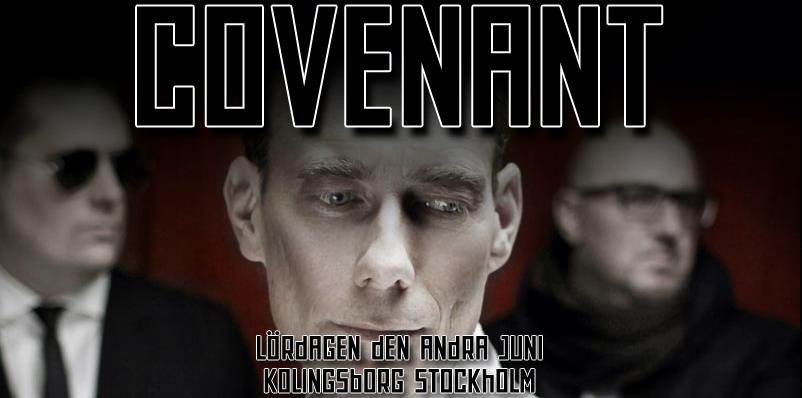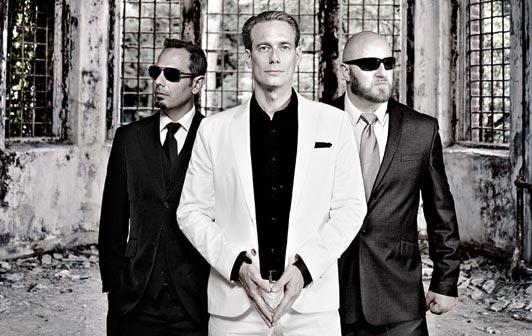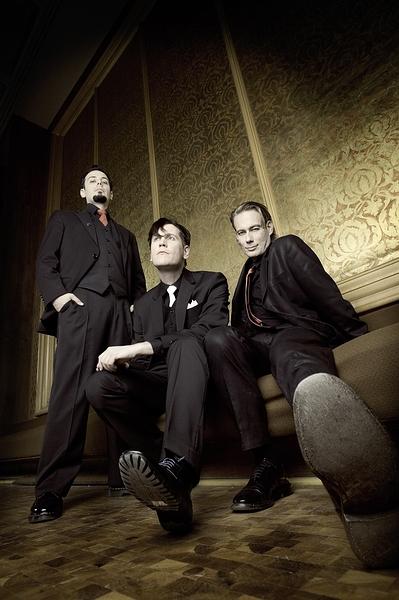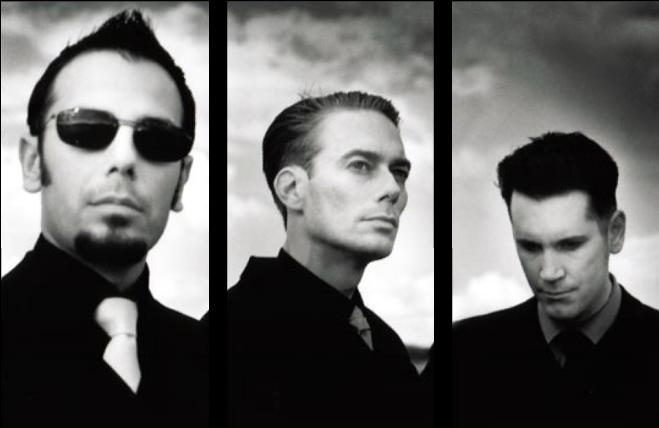
ES: Мы планируем сыграть кое-что из старых и новых композиций, но все-таки основное внимание уделим нашей последней пластинке “Modern Ruin” и дебютному альбому “Dreams of a Cryotank” - недавно вышло в свет его специальное юбилейное издание на виниле. Может быть, будет и что-то из пока неизданных треков, которые потом войдут в альбом “Leaving Babylon”.
Было бы очень интересно узнать, с чем связано решение Йоакима Монтелиуса отказаться от живых выступлений?
Joakim Montelius: Такое решение было принято по двум важным причинам. В первую очередь, потому что недавно я стал отцом и хочу больше времени проводить с дочерью, видеть, как она растет. Это непросто, если проводишь месяцы в разъездах. Во-вторых, я перестал получать удовольствие от живых выступлений. Я никогда не мечтал о том, чтобы стоять на сцене, это стало для меня скорее случайностью, чем достижением цели. Да, это было здорово, и я скучаю по путешествиям, постоянным встречам с людьми, новыми и старыми знакомыми. Но, к сожалению, в жизни нельзя успеть сделать сразу все, что хочется, и мне пришлось выбирать. Я считаю, что сделал правильный выбор. Мне гораздо комфортнее в эмоциональном плане будет сосредоточиться на карьере писателя – у меня раньше не было возможности этим заняться.
На концертах выступит Дэниел Йонассон. На сайте вы назвали его диджеем-суперзвездой. Кто он еще?
Как он попал в состав группы?
JM: Дэниел Йонассон – организатор и промоутер клубных концертов и фестивалей, талантливый диджей, а также основатель группы Dupont. Он – одна из ключевых фигур на шведской сцене, а еще наш большой друг. Он также работал раньше с Covenant в качестве тур-менеджера и осветителя. Так что, когда я решил прекратить концертную деятельность, мы сразу решили обратиться к нему. К нашей большой радости, он согласился. Я считаю, что он стал отличной заменой. Конечно, мы разные и по характеру, и по поведению на сцене, но я вижу в этом только плюсы.
Joakim остался в студийном составе. Какие ощущения от разных составов при записи и на концертах? Нет ли каких-то неудобств?
JM: Вовсе нет. Для Covenant запись и концерты – это два совершенно разных процесса. iКак я уже говорил, мне гораздо комфортнее работать в студии, как музыкант я больше подхожу для творческого процесса, требующего концентрации и погружения в себя. Выступать на сцене – совсем другое дело, поэтому никакого диссонанса не возникает. У меня нет своего уникального стиля, который отличал бы меня от других музыкантов, а это, пожалуй, большой недостаток.
Довольны ли вы тем, как приняли "Modern Ruin"?
JM: Альбом был пр
 инят хорошо, и это, конечно, здорово. Но, наверное, употреблять в этом контексте слово «довольный» не совсем правильно. Альбом не может быть направлен на какую-то реакцию слушателей, мы пишем его для себя. Я имею в виду, что мы не размышляем, что могло бы понравиться или не понравиться слушателям, сидя в студии. Мы пишем то, что нам самим кажется правильным, а потом нам остается скрестить пальцы и надеяться, что остальным наш материал тоже понравится. В этом плане все, что не является откровенным провалом можно назвать успехом. К счастью, то, что мы делаем многим людям нравится, пока наши релизы можно назвать вполне успешными. Если не сразу, то со временем их неплохо принимают. Впрочем, мы не из тех, кто любит шокировать слушателей чем-то радикальным, наша музыка растет и развивается постепенно.
инят хорошо, и это, конечно, здорово. Но, наверное, употреблять в этом контексте слово «довольный» не совсем правильно. Альбом не может быть направлен на какую-то реакцию слушателей, мы пишем его для себя. Я имею в виду, что мы не размышляем, что могло бы понравиться или не понравиться слушателям, сидя в студии. Мы пишем то, что нам самим кажется правильным, а потом нам остается скрестить пальцы и надеяться, что остальным наш материал тоже понравится. В этом плане все, что не является откровенным провалом можно назвать успехом. К счастью, то, что мы делаем многим людям нравится, пока наши релизы можно назвать вполне успешными. Если не сразу, то со временем их неплохо принимают. Впрочем, мы не из тех, кто любит шокировать слушателей чем-то радикальным, наша музыка растет и развивается постепенно. "Modern Ruin" вышел почти два года назад. Как насчет нового альбома?
JM: Сейчас мы работаем над новым альбомом. Он будет называться “Leaving Babylon” и ориентировочно выйдет в середине 2013 года. Я уверен, кое-что из нового материала вы сможете услышать на фестивале Synthetic Snow.
Некоторые музыкальные сайты называют Covenant "одними из основателей стиля future pop". Что вы можете сказать об этом?
JM: О нет… Мне никогда не нравилось это слово. Если бы я знал, что оно к нам так «прирастет», я бы вместо него сам что-то другое придумал. Мы
 никогда не думали, что это выльется в новый поджанр. Но да, мы, в общем-то, сами виноваты. Никто из нас не думал о том, что мы играем в каком-то новом стиле, это не было каким-либо координированным движением. Хотя, оглядываясь в прошлое, я могу сказать, что все-таки это было в своем роде феноменально - Apop, Covenant и VNV примерно в одно время выпустили альбомы с похожим звучанием. Это было чистым совпадением. Конечно, мы знакомы, но мы никогда не договаривались о том, чтобы двинуться в едином направлении. Наверное, причиной стало то, что мы примерно одного возраста, выросли на одной музыке. И мы не немцы. И Covenant, и Apoptygma вдохновлялись танцевальной музыкой. VNV, правда, поначалу играли в более традиционном стиле. Правда, в таком схожем стиле мы играли всего каких-то пару лет, а потом снова пошли каждый своей дорогой. Сейчас кто-то вряд ли заметит большое сходство между нашими группами. В общем, вышло так, что мы создали монстра. Совершенно случайно.
никогда не думали, что это выльется в новый поджанр. Но да, мы, в общем-то, сами виноваты. Никто из нас не думал о том, что мы играем в каком-то новом стиле, это не было каким-либо координированным движением. Хотя, оглядываясь в прошлое, я могу сказать, что все-таки это было в своем роде феноменально - Apop, Covenant и VNV примерно в одно время выпустили альбомы с похожим звучанием. Это было чистым совпадением. Конечно, мы знакомы, но мы никогда не договаривались о том, чтобы двинуться в едином направлении. Наверное, причиной стало то, что мы примерно одного возраста, выросли на одной музыке. И мы не немцы. И Covenant, и Apoptygma вдохновлялись танцевальной музыкой. VNV, правда, поначалу играли в более традиционном стиле. Правда, в таком схожем стиле мы играли всего каких-то пару лет, а потом снова пошли каждый своей дорогой. Сейчас кто-то вряд ли заметит большое сходство между нашими группами. В общем, вышло так, что мы создали монстра. Совершенно случайно.Как изменилась электронная сцена за то время, что функционирует группа Covenant?
JM: Когда мы начинали, разные стили электронной музыки между собой особо не пересекались. Они были изолированными друг от друга. Сейчас же музыка стала более открытой, что меня очень радует. С другой стороны, из-за такой разноплановости музыкальной сцены начинающим музыкантам стало сложнее завоевывать аудиторию. Но, тем не менее,
 это толкает вперед, заставляет развиваться, а это очень здорово. Сейчас так много хороших групп и музыкантов. В девяностых выбор был гораздо скуднее.
это толкает вперед, заставляет развиваться, а это очень здорово. Сейчас так много хороших групп и музыкантов. В девяностых выбор был гораздо скуднее. При создании музыки учитываете ли вы мнение друг друга? Как рождаются финальные версии композиций?
JM: Начинается все с «зацепки», если можно так сказать. Это может быть мелодия, бит, фраза из текста песни, или просто какой-то звук – то, что цепляет, привлекает внимание. Это и ложится в основу композиции. Затем мы разрабатываем структуру, играем со звучанием и эффектами, пишем тексты – все эти процессы идут примерно одновременно. Потом уже мы упорно доводим трек до готовности. Иногда на это уходит день, а иногда и несколько месяцев, и в таких случаях материал часто откладывается в долгий ящик, чтобы потом, может быть, к нему вернуться. В общем, никакого четкого плана мы в работе над песнями не придерживаемся. Музыка сама выбирает свой путь, и мы не в силах контролировать ее волю.
Какая композиция из репертуара Covenant вам больше всего по душе?
JM: На этот вопрос невозможно дать ответ. Для меня музыка – это эмоции, и, как и все люди, я могу испытывать широкий спектр эмоций. Иногда мне хочется чего-нибудь мрачного и жесткого, иногда – тоскливого и душещипательного, иногда – каких-нибудь милых приятных мелодий, и так далее. Думаю, у нас найдутся композиции под любое настроение, учитывая, сколько всего мы уже написали. Завсегдатаям танцполов мы известны мощными битами и мелодиями, но наша музыка гораздо шире, у нас есть и другие треки.
И, напоследок, пару слов для российских поклонников Covenant и читателей darkside.ru
ES: Мы рады вернуться в матушку-Россию.В этой замечательной стране мы всегда отлично проводили время. Давайте вместе взорвем танцпол на фестивале Synthetic Snow!
Интервью: Екатерина Kiseki
4 дек 2012